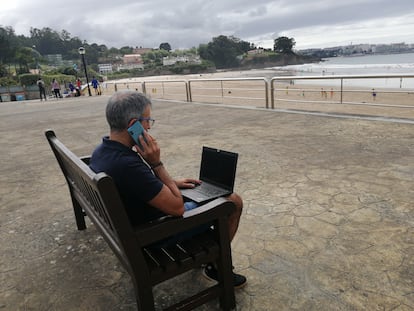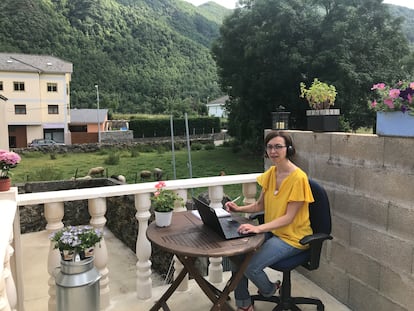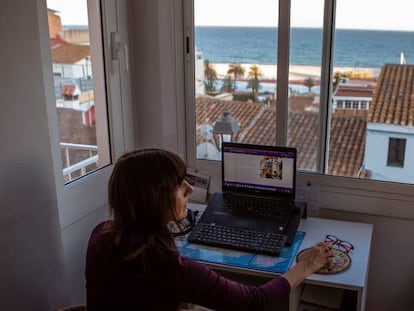As the weather gets hotter, Spain’s remote workers move to the beach
With the coronavirus crisis keeping employees out of the office, many are escaping the heat in second residences on the coast and in the mountains

The coronavirus crisis has normalized teleworking in Spain. Now, as the temperature begins to rise, many workers have begun looking for a place to take refuge from the July heat, where they can continue to work remotely. Almost all, regardless of the sector, have become used to virtual meetings, to organizing their work and personal life in the same space, and to reporting over the telephone. When bosses and employees were sent home due to the coronavirus pandemic, many began to look for a new home office with views of the beach or the mountain.
“We are seeing a huge demand in portable Wi-Fi devices these last few weeks, coinciding with trips to holiday homes,” says Miguel Moral, the managing director and co-founder of WifiAway, a company that has been providing portable internet services since 2016.
If we organize ourselves well, it is irrelevant whether the worker is in the physical workplaceAlex Martínez Roig, head of content at Movistar+
The Spanish telecommunication company Telefónica has noticed the same trend. “The rise in requests is similar in areas with fewer than 1,000 inhabitants as in those with more than 50,000, which is not typical,” said a company source.
Many companies in Spain had to radically change their business practices in response to the coronavirus crisis and the government’s recommendation for home working. In May, according to a study of work trends published by the consultancy group Genetikomm, only 41% of companies had introduced a teleworking culture.
Elena Mendoza Lora, the vice president of sales at the IT company Avanade, says that she expects clients will want help fostering this type of culture and in “understanding new ways of conceiving work.” In her opinion, the decisions they make now “will change the trajectory of their business,” allowing them to “abandon trends and embark on the path that is best suited to themselves. There are as many ways of remote working as there are businesses,” she says.
Eva Snijders has long been sold on the idea of teleworking. She swapped Madrid for Benalmádena in Spain’s Costa del Sol to start Genetikomm. She attends video conferences and listens to proposals from her garden. “When we moved to Costa del Sol, we were worried we would be disconnected, that clients would forget about us. When the pandemic arrived, we were pleased to have the tools and the habits to work remotely,” she explains.
Flexibility
According to a study by the freelance services company Fiverr, 76% of small and medium businesses will maintain teleworking after the coronavirus crisis. The pharmaceutical company Lilly, for instance, allowed staff long ago to connect “without any limit on days from their second home,” says Sandra Rebello, the company’s head of communication.
She talks to EL PAÍS from her home, nestled in the mountains of Caboalles de Abajo, a village of 1,000 residents in León province, where she is surrounded by animals and greenery. “The fact that the company adapts to us gives me a lot of trust. They have facilitated resources like chairs, screens, and so on, and the internal communication has been very efficient,” she says.
Lilly, which never stopped production at its medical plants, is beginning to bring back some workers in shifts, such as scientists and researchers. But most continue to work from home.

There are few specialties where remote working is not possible, at least partially. Not even publicity, which is traditionally dependent on the needs and conditions of clients. “The option [of teleworking] had been introduced by the agency a long time ago to improve work-life balance and increase productivity,” says Javier Fraile, the managing director of PR agency Axicom. This meant the move to working from home and second residences did not have any impact on the business. Fraile connects four days a week from Lián, on the coast of A Coruña in Galicia. Until September, he can work anywhere he likes and after that, different options will be offered to combine teleworking and in-office work.
A few months ago, few people would have thought that a television station could air and invent high-quality programs from home in less than two weeks. But that’s exactly what the subscription network Movistar+ was able to pull off. The company provided equipment and material to all of its employees, from journalists and directors to riggers and other roles. What’s more, Movistar+ renewed contracts remotely, which was “unprecedented,” according to Alex Martínez Roig, the head of content. “The fear of teleworking is gone. If we organize ourselves well, it is irrelevant whether the worker is in the physical workplace,” he says. In his opinion, the crisis has accelerated much-needed changes. “Without the virus, we would have taken five years to get to where we are; we would have gone bit by bit, debating everything a lot more,” he adds.
The move to remote working has also highlighted the importance of clear internal communication. “If a company communicates adequately, it gives you confidence and shows that you matter, it reassures you and you respond to that,” explains Francisco Javier Riloba, the head of production at Movistar+. Like Riloba, all those interviewed agreed that they had strengthened their bond with their work colleagues during this time, despite the distance.
“From a human point of view, the teams have become stronger, more solid and together; before this there was a greater feeling of having your work controlled,” says Martínez Roig. Many companies have even shown an interest in the wellbeing of their staff. Lilly, for example, is providing ongoing courses and health programs on topics like yoga, pilates and mindfulness.
English version by Melissa Kitson.









































